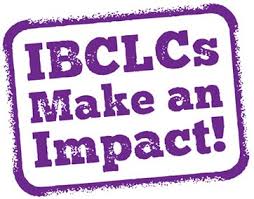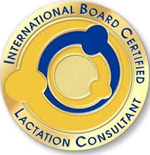What is an IBCLC? I am going to start by telling you what all those letter stand for:
An International Board Certified Lactation Consultant (IBCLC) is a health care professional who specializes in the clinical management
of breastfeeding. An IBCLC works in a wide variety of settings, providing leadership, advocacy, professional development, and research in the lactation field. We have to adhere to standards of practice and a code of ethics, and work within a defined scope of practice. We must maintain our certification every 5 years by continuing education or by exam. Before sitting for the exam, candidates must demonstrate extensive clinical experience ( 1000 hours) and advanced lactation education ( at least 90 hours). IBCLCs are prepared to help with any breastfeeding issues, from very basic problems to complex situations.
You will find IBCLCs working maternity units in hospitals, in the NICU and SCN. We work in outpatient clinics in WIC offices, pediatric and physician and midwives offices. IBCLCs also have private practices where they meet with moms on an individual basis in their office or in your home. There are currently over 28,000 IBCLCs practicing in over 102 countries. We even have one day a year that we celebrate IBCLC Day, which is on the first Wednesday of March. All this, and to think that this profession was not around 35 years ago.
I was interested to learn the breakdown of IBCLCs and learned that there are over 15,000 in the US, next comes Australia with 2149, then Canada with 1719 and Germany with 1498. I have added a link to the complete list IBCLCs in the show notes.
There are prerequisites to fulfill before taking the International exam. It is slightly different for each person, depending on when they were certified and what degrees they had before becoming an IBCLC. Common coursework needed before sitting the exam ae: Education in biology, anatomy & physiology, nutrition, counseling or psychology, infant & child growth and development, introduction to research and sociology or cultural sensitivity (may be covered in basic professional education).
About the time I decided to become an IBCLC, I decided to start with the entry level course so I could get a sense if this is the direction I wanted to go in. I wanted to see if I liked it enough to devote a few years and many dollars to learning all I need to know to become an effective IBCLC. The course was 45 hours and there were about 20 other people in the class. Most were WIC employees who were not planning on taking their education further. They just wanted to know enough to talk about the basics to their clients and to teach a breastfeeding class. A few students were nurses who worked in postpartum or labor and delivery and soon realized they had a passion for helping moms with breastfeeding. Each one said that they saw the need for further training as they realized that the more they worked with moms and helping them with breastfeeding, the more they realized the had only learned the basics. So the 45 hour course was entry level for them. They wanted to learn more and some had a goal of becoming an IBCLC.
 The reasons I wanted to become an IBCLC is because the impact I felt I could make on the moms around me. As a childbirth educator and a birth doula, I was seeing so many moms who wanted to breastfeed, started breastfeeding, but many did not quite make it past the few weeks or first month. I tried to help them, but often found that my skills were lacking. Even then, I did not set out to become an IBCLC. The opportunity to become one, just sort of fell in my lap. This is a story I will save for another episode.
The reasons I wanted to become an IBCLC is because the impact I felt I could make on the moms around me. As a childbirth educator and a birth doula, I was seeing so many moms who wanted to breastfeed, started breastfeeding, but many did not quite make it past the few weeks or first month. I tried to help them, but often found that my skills were lacking. Even then, I did not set out to become an IBCLC. The opportunity to become one, just sort of fell in my lap. This is a story I will save for another episode.
Since its inception in 1985, the exam you need to pass, it has only been given once a year, and has been an all day exam, which I typically have had to travel an hour to the exam location. A few years ago, the organization, offered some of us the opportunity to join a pilot program where they would be offering a computer based exam at local testing venues. I jumped at the chance and could not have been more pleased. I drove exactly 15 minutes to the building. Once the exam started, I had a choice of taking breaks whenever I wanted to, or just powering through without taking a break. I opted to just take it from beginning to end. Not that I was racing to get done as fast as I could, however, I finished before noontime, whereas before, the exam was not over until at least 4 or 5. This was because they had dedicated break times where you had to take the break, and a long lunch time where you also had to take the time off. Needless to say, I was much happier being able to take it on my own timeline. The exam was just as intense as it has always been, but it did not have to be a whole day affair. This was a huge success and an option offered to many exam takers. Thank goodness I passed and believe it or not, I am up for re-certification again this October, which I need to do every 5 years. Do I stress when I take the exam? You bet I do?
As our knowledge in the field of lactation advances, so does the testing aspect as it reflects current research. You might ask: it is just breastfeeding for goodness sakes! On that one hand, you are correct – baby – breast – milk – BOOM – that is all you need to know. As long as things are pretty straight forward, I could help a mom with what I learned in that 45 hour course. Here are just some issues that we come into contact with every day and this is why we need to know so much more. The more information we have about – premature babies – sick babies – special needs babies. mid line defects such as ties and clefts, babies who have broken clavicles, hip dysplasia, torticollis, other health issues that make breastfeeding more difficult like heart issues or lung issues or feeding and swallowing problems. Moms who have had breast surgeries, reductions, biopsies, implants. Mom who have had infertility issues, are taking prescription medicine, have diabetes, depression, birth trauma, breast and or nipple anatomy that is out of the ordinary, medical concerns regarding low milk supply, or oversupply, or breastfeeding aversion
I am always learning as each mother and each baby teach me something new. As much as I hate taking tests, I am glad this is a requirement to keeping our certification as it forces us to keep current.
As an IBCLC, every day, when I leave my home life, to enter into the life of a family for a brief period of time, what fuels me is the positive impact that I am able to have on each family. I know that as I work with each individual mother, I am doing my best to help her with whatever breastfeeding challenges she is experiencing. For the modern mother, there are so many challenges, so many barriers that get in the way of breastfeeding. As IBCLCs, we are trained to take every mother/baby pair situation separately and do our best to meet their needs. We work closely with families as our goal is to increase breastfeeding rates, improve breastfeeding outcomes and do our very best to help all those who want to breastfeed to do so in comfort and in joy, for as long as they desire to.
There are many places families can go to for breastfeeding help once discharged from the hospital, birthing center or your birth team leaves you after your home birth. All the lovely professionals whom you have come to know and trust, well the reality is they don’t get to go home with you. you can call an 800#, a warmline, the triage nurse at your babies Drs office, local breastfeeding volunteer groups, entry level breastfeeding educators. You can get help from your neighbor, from the internet, facebook groups, from videos and books. So, why should you seek help from an IBCLC?
Breastfeeding should be easy, convenient, pain free. If you are experiencing problems with breastfeeding and they cannot be solved quickly and easily with one of the mentioned sources, you should seek help from an IBCLC because the risk of discontinuing breastfeeding is higher each day the problem goes unresolved. Think about this: When you have a problem that is not easily solved, you typically go to an expert in that field for help. If you have a toothache, you go to a dentist, if you are concerned about your heart, you go see a cardiologist, if you have back problems that are not solved by simple stretches and exercises, you go see a massage therapist, or chiropractor, you have a problem with dry eyes and the solutions you purchase over the counter do not help, you go see an eye doctor. You are getting my drift right? If you are suffering with breastfeeding challenges, getting the right help is also very time sensitive. Meaning, that while you are trying to figure out things, your milk supply may be suffering, your pain level may be increasing, your baby might not be doing well. This is not an area of healthcare that you want to wait too many days or weeks or months before seeking specialized help.
I am attaching links to various organizations that you can learn more about IBCLCs, our credentialing organization, our membership organization, – internationally and locally. If you would like detailed information about becoming an IBCLC, you will find enough on this links to get you started.
See you next week on FAQ #2 , where I will share my personal reasons for becoming an IBCLC and the Pathway I took to becoming an IBCLC
Until that time, I leave you with todays quote::
There is no end to education. It is not that you read a book, pass an examination, and finish with education. The whole of life, from the moment you are born to the moment you die, is a process of learning. Jiddu Krishnamurti
International Board of Lactation Consultant Examiners – http://iblce.org/
International Lactation Consultant Association – http://www.ilca.org/home
United States Lactation Consultant Association – https://uslca.org/


